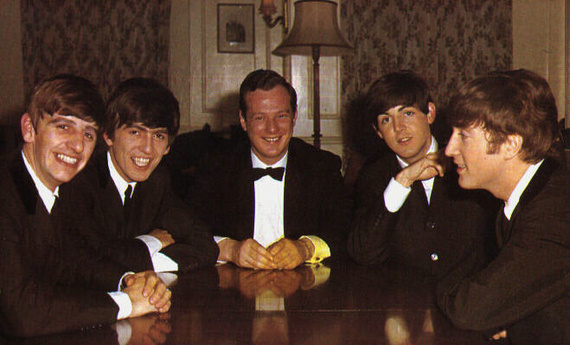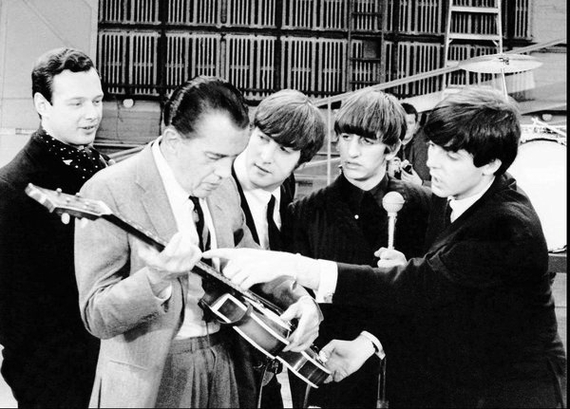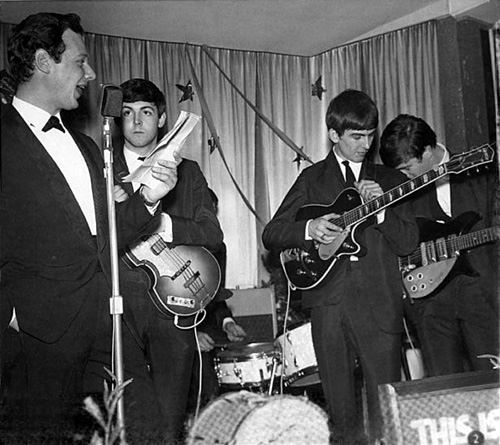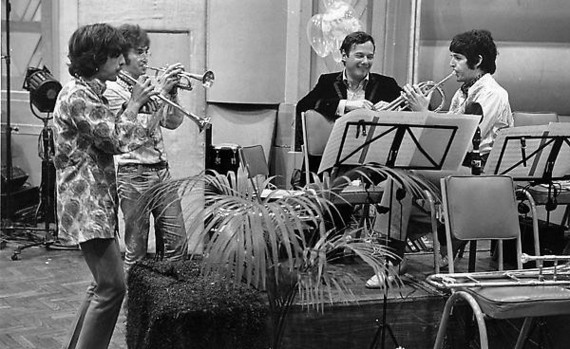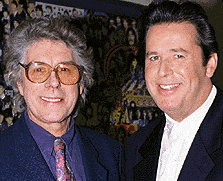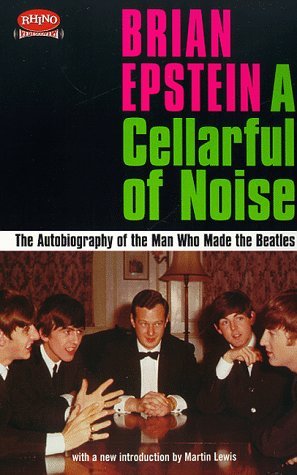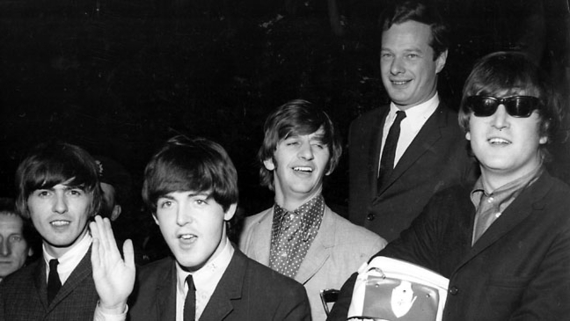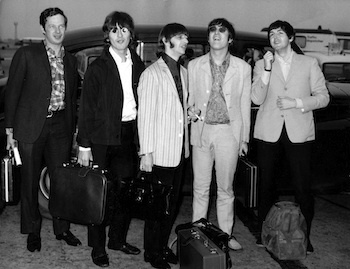Beatles manager Brian Epstein has finally been inducted into The Rock and Roll Hall of Fame. Beatles scholar Martin Lewis instigated and spearheaded the ultimately successful 15-year campaign to have Epstein honored. In this special essay, Lewis documents the importance of Brian Epstein to the Beatles' success. In the second half of this piece, he recounts the inside story of the long struggle to have Epstein inducted. There is a also a new video tribute to Epstein by one of his many admirers.
Brian Epstein changed our world more than most people who have ever lived. And that's no exaggeration.
The reason for that statement is very simple.
Brian Epstein is the man who gave us the Beatles. And it is an unassailable fact that the Beatles changed not just music, hairstyles and clothes -- but also the entire cultural, social and political fabric of the twentieth century. And changed those things immeasurably for the better. Furthermore those changes have endured and continue to influence our present-day world.
First things first. Brian Epstein didn't create the music It was the genius of the Beatles, their compositions, their recordings, their performances, their personality, their humor, their charm, their social activism that made the actual changes. Without the Beatles -- none of those changes would have happened. They were the ones with the muse, the talent and the creativity that changed the world.
But without Brian Epstein -- none of us would have ever heard of the Beatles.
(Unless of course we were among a tiny coterie of a few hundred people in Liverpool or the German port of Hamburg in 1961.)
Put simply -- The Beatles changed the world. But Brian Epstein's gift was that he changed them. And gave them the pathway to reach us.
"Brian was a beautiful guy. And he was an intuitive, theatrical guy and he knew we had something. He presented us well..." - John Lennon MBE
Fact: At the point that Brian Epstein took over management of the Beatles in January 1962 -- the primary nucleus of John, Paul and George had been together for five long years of a seemingly never-ending apprenticeship -- primarily in their hometown and a few months in Hamburg. And despite their immense nascent talent and brimming potential, they had been rewarded with nothing more than local cult followings in those two hard-scrabble seaport towns.
On top of that -- they were just one of over 300 "beat groups" in Liverpool all striving for elusive stardom. And there was the handicap that Liverpool was a blue-collar city in the north of England. The British record industry was headquartered in London -- and that city's tastemakers looked down their noses at upstarts from the unfashionable provinces to the north. It was like asking a sophisticated Manhattanite to accept that the future of the world's culture would be found in Boise, Idaho.
"He wanted to manage us and we weren't going anywhere anyway. So we said 'yes you might as well...'" - George Harrison MBE
The man who made the difference to the Beatles -- and therefore to us -- was Brian Epstein.
He first saw the group performing in November 1961. And though he was only just 27 and had zero experience of artist management, he instantly saw past all the rough edges -- the sartorial drawbacks and the happy-go-sloppy presentation. He got the music, he got the charm, the humor, the potential. And he saw the world's future.
Within a month he was their manager. He slaved to get them a record contract -- persevering through rejections from practically every record label in Britain until he finally met and persuaded George Martin to sign them to EMI's tiny Parlophone label. George Martin has been crystal clear that while he saw a glimmer of potential at the audition he gave the Beatles in June 1962, it was his belief in Epstein that finally convinced him to sign them.
"First of all he picked them. He actually said 'I want to be your manager... I want to look after you.' And if he hadn't brought them to me, I wouldn't have recorded them. He gave them style... He gave them taste.... He gave them their charm and their impeccability in dress." - Sir George Martin
If Epstein had done nothing more than get them that break -- it would have sufficed ("dayenu!"). But he did so much more that ensured that the Beatles' talent would reach the world's eyes, ears and heart.
He got the Beatles out of their mid-1950s 'leather 'n' jeans' look and into very stylish early-1960s mod suits. Without that they would never have got on TV shows in that era. He gave them presentational style. He nurtured and encouraged them to use their charm and humor -- but with professional panache.
"The Beatles changed our lives. Brian Epstein changed theirs..." - Andrew Loog Oldham (manager/producer The Rolling Stones 1963-1967)
The Beatles that the world fell in love with were the four musicians -- but as visually shaped and presented by Brian. He never interfered with their music. He was savvy and understood that the happy accident of meeting George Martin had delivered them unto an incredible nurturing man who was the perfect producer for them.
Epstein's role in the early success of the Beatles was totally crucial. He galvanized the record company (which was highly skeptical of this oddly coiffed group in the early days), he worked tirelessly to secure promotional opportunities on radio and television, he got them more and better live bookings.
Ultimately he believed in them. His love for them was unconditional, his belief in them unshakable.
"He was not motivated by money but by a desire to make the dreams of his artists and pals come true. How rare and special that was..." - Pattie Boyd Harrison
As early as 1962 he proclaimed to one and all that the Beatles would be "bigger than Elvis". At the time this seemed like a ludicrous prediction. Elvis Presley was the biggest teen pop star of all time. A worldwide phenomenon. And he was American! The Beatles were from 'li'l ole England'. And though there had been a few sporadic hit singles of British origin, no pop act from the UK had ever had sustained success in the USA.
But Brian KNEW. He believed passionately in their potential.
And when the 'smart boys' of Capitol Records in the USA turned down the Beatles no less than four times during the magical year of 1963 as the Beatles conquered the UK, Europe, Australasia and elsewhere, Epstein didn't give up. He devised a brilliant and audacious plan. In November 1963, he flew to New York and secured a meeting with the legendary variety show host Ed Sullivan. And though the Beatles didn't even have a U.S. record deal at that point -- he persuaded Sullivan to book the Beatles for three consecutive appearances on the Sullivan show the following February. The ultimate talent management coup of all time!
And then he used THAT coup to out-poker-play the president of Capitol Records into signing the group and committing to a big marketing spend to promote the group. Ultimately of course -- as Epstein was always the first to say -- it was the Beatles' music that made the final sale with young Americans and turned them into lifelong Beatles fans. But if Epstein hadn't done his magic in the first place -- then those young ears would never have heard the Beatles' magic.
The litany of Epstein's other achievements for the Beatles (and for many other artists he managed) over the next few years till his tragically premature death (an accidental overdose of sleeping tablets) in August 1967 is long and warrants attention in a forum that has more space than this cyber venue.
But here are two key facets.
Prior to Epstein's management of the Beatles, the normal attitude of talent representatives in the popular music field was to milk the act and not let the artist change a winning formula that might stop yielding those lucrative golden eggs. Brian Epstein totally ignored that rule. His primary motives were never financial. His passion was to enable the Beatles to fulfill their vast creative potential.
Prior to the Beatles, most musical acts in the popular field did not make quantum leaps in creativity. Nor did they aspire to. At best, they just got better at doing the same things. They improved their craft... their vocalizing and/or their instrumental playing. But the Beatles were not content to live within the established boundaries of the 12-bar-blues-based popular song that had prevailed from the earliest days of rock 'n' roll. They instinctively pushed the boundaries of melody, harmony, rhythm, lyrics and subject matter in their compositions -- and they expanded the horizons of how recorded music sounded with their innovative approach to vocal performance, instrumentation, arrangements and the entire aural soundscapes of their work.
They created masterpieces far beyond the wildest imaginations of the wonderful pioneers of rock music who had inspired them. Elvis, Chuck Berry, Little Richard, Buddy Holly, Eddie Cochran, Gene Vincent, Bo Diddley were all truly enjoyable artists who opened up the door. But ultimately they worked in simple monochromatic shades on one-dimensional planes. Effective and visceral. But the Beatles opened popular music up into a three (and sometimes four) dimensional wonderland with a rainbow of technicolor hues not imaginable in the 1950s. In cinematic terms they took recorded music from the silent movie era into talkies, color and 3D -- all in the space of seven years. To look at all they achieved in the years 1962-1970 is like seeing a time-lapse film of a single-cell organism evolving into homo sapiens at warp-speed. They were the Big Bang that made it all possible...
Each time the Beatles made one of their quantum leaps in creativity there was a chance that their teenage fans might be mystified by the changes. Listen to "Love Me Do" (recorded September 1962) and then "Tomorrow Never Knows" (recorded April 1966). Note the evolution in both music and ambition that went from singing "I Want To Hold Your Hand" (recorded October 1963) to telling the listener "I'd love to turn you on" (recorded January 1967). In spans of just three and a half years they went from the equivalent of Paleolithic paintings on the walls of the Lascaux caves to creating exquisitely beautiful sonic holograms on the bright side of the moon!
And as the Beatles evolved from exuberant boy-band caterpillars (the era of "She Loves You" to adventurous chrysalis ("Rubber Soul") and into gloriously artistic butterflies ("Revolver," "Sgt Pepper" and beyond) -- what was the reaction of Brian Epstein? Was he fearful in case the fans would desert them as they eschewed having any set musical formula and rapidly evolved with each new record? Quite the opposite. Regardless of the very real danger (based on conventional wisdom) that baffled fans might abandon them (which would have hurt his own pocketbook), Epstein positively reveled in the Beatles' emerging creativity. It was a source of huge pride to him that his "boys" were developing creatively and flourishing. What he cared about was THEM and helping them achieve everything they were capable of. That was as revolutionary in pop artist management as their music.
"He was very good. He started like we did. He didn't know the game, neither did we, really. We knew how to play, and he tidied us up and moved us on.... More our friend than anything else... Brian was a friend of ours..."
- Ringo Starr MBE
Another example. In early 1967 Brian was approached by Britain's BBC. It was coordinating a major TV special for the end of June in which nations throughout the world would be linked up for the first time ever by a global satellite. The live show would feature contributions from each participating nation. The BBC wanted the Beatles to represent Britain. Brian knew that this live broadcast would be seen by a huge audience (it turned out to be over 400 million) and it would be taking place just three weeks after the worldwide release of the Beatles' highly anticipated new album "Sgt. Pepper's Lonely Hearts Club Band".
Any ordinary money-motivated manager would have thought "ca-ching! Promotional opportunity! Have the guys perform one of the songs from the new album and rack up more sales..."
Brian's first thought: This is an historic occasion -- a platform for the Beatles to express a message to the entire planet. So he went to them and encouraged them to create something special for the broadcast. NOT a promotion for their new album -- but a purpose-written new song. John came up with "All You Need Is Love" -- a tune that had been gestating for a while -- a thematic descendent of his 1966 song "The Word". The result of Brian taking the less obvious path -- eschewing the instant financial rewards of promoting their new album -- was that the Beatles created a new anthem for the age -- and for the ages... A singular expression of their philosophy. That is both a time capsule of that halcyon summer-of-love -- and also a timeless paean to what the world could and should be.
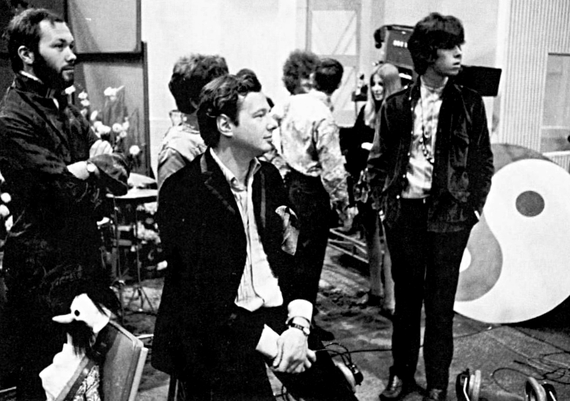 Brian Epstein (center) at the rehearsal for the Beatles' live TV performance of "All You Need Is Love" on Sunday June 25th 1967. On the left, Brian's General Manager Peter Brown (later name-checked in "The Ballad of John & Yoko") to the right Promotion Manager Tony Bramwell.
Brian Epstein (center) at the rehearsal for the Beatles' live TV performance of "All You Need Is Love" on Sunday June 25th 1967. On the left, Brian's General Manager Peter Brown (later name-checked in "The Ballad of John & Yoko") to the right Promotion Manager Tony Bramwell.
That live worldwide TV broadcast in June 1967 turned out to be the last of Brian's many spectacular successes for the Beatles. What a pinnacle! Exactly ten years before that, John and Paul met for the first time at a church garden party where John and his school-pals group The Quarrymen performed in front of approximately 400 villagers in Woolton just outside Liverpool. Ten years later John and Paul -- with their mates George and Ringo -- performed in front of approximately 400 MILLION television viewers worldwide. It was a fairy tale piece of symmetry that would not seem plausible if you wrote it in a novel or screenplay. But it did happen. And it happened because five and half years earlier -- Brian Samuel Epstein watched the Beatles in a crowded subterranean cavern at a lunchtime concert and had an epiphany.
Bruce Springsteen's manager Jon Landau -- a man I very much like and respect, who has worked very skillfully on behalf of Bruce for four decades -- famously wrote of his future client in 1974 "I saw rock and roll future and its name is Bruce Springsteen". I think Jon would agree that Brian Epstein didn't just see rock and roll future. He was an integral part in making it happen.
"No one else was going to stack up against Brian in my mind. You couldn't have the flair, the panache, the wit, the intelligence that Brian had - they would just merely be money managers. Brian was far more than that..."
- Sir Paul McCartney
Were there any major errors in Epstein's management? Just one -- but it was an error born of innocence, naiveté and misjudged delegation and not remotely an issue of Epstein's honesty or integrity which, to this day, everyone agrees was impeccable.
Merchandising was virtually an unknown field in Britain in the early 1960s and with his hands overfilled, Epstein delegated handling of this aspect of the Beatles to a trusted lawyer. Unfortunately the lawyer was clueless and didn't seek guidance. So the Beatles (and of course Epstein) lost out on a revenue stream for quite a while. One that wouldn't have existed but for Epstein's promotion of the Beatles. So it was a drag -- but it was one understandable hiccup in an otherwise superb operation. Needless to say, the classy and timeless presentation of the Beatles that Epstein had orchestrated in 1962-1967, including the iconic photographs, the sartorial splendor and the "Yellow Submarine" animated feature that Epstein extolled to a reluctant group, has meant that such misplaced revenue has been replaced in recent decades by vast quantum amounts.
"If anyone was the Fifth Beatle - it was Brian" -- Paul McCartney
"He was one of us..." -- John Lennon
A few ignorant Monday Morning Quarterbacks have wondered why the Beatles were initially on such low record royalty rates. Duh! All record royalty rates for unknown artists were pitiful in that era -- and when you've been turned down by every label in the land, you have no bargaining position. Brian got the best deal that could be got at the time and in the circumstances.
How come the Beatles don't own their own music publishing? The same reason that the Stones, the Who, the Kinks and so many of their peers don't own the publishing of THEIR songs from that era. The recording and publishing companies of that time were exceptionally skillful at screwing artists, composers and managers. And Brian and the Beatles got screwed just like everyone else. And the one or two sharp/shark managers (no names necessary) who did beat the system also screwed their artists. It was a lose-lose world. But one thing is clear. Brian was always impeccably honest. And the scale of the success he helped the Beatles achieve paved the way for future artists to have bargaining positions not available to Epstein and the Beatles in the early 1960s.
It's 46 years since Brian Epstein passed away. He was just 32. But he gave us the Beatles. The least he deserves in return is our respect, gratitude and love. Shalom Brian.
THE LONG MARCH TO HAVE BRIAN EPSTEIN HONORED
The heroes who inspired me to launch the campaign to get Brian in the Rock and Roll Hall of Fame were two old friends of mine who both loved Brian and were dedicated to keeping his memory alive in a world that seemed to be forgetting him. Derek Taylor who had been assistant to Brian in 1964, co-writer of Brian's 1964 autobiography and Beatles publicist in 1964 and 1968-1970. And Ray Coleman, veteran music journalist and author of the only Epstein biography -- published in 1989 -- and a superlative Lennon biography. Derek had been my mentor and first boss in the early 1970s. Ray was also one of my longtime friends.
"Brian Epstein is a crucial part of the Beatles story. Brian was a most wonderful chap... A terrifically good servant for them. Brian gave them a very, very nice road. Really quite a carefree way into fame by taking care of business. When he 'went' it was pretty well all over in terms of direction." - Derek Taylor
Ray and Derek were the foremost -- and almost the only -- keepers of the flame for Brian. They both died of cancer, within a 12-month period 1996-1997.
Derek and I had first discussed the possibility of Brian being inducted into the Hall of Fame at the Hall's third induction ceremony in January 1988. That was the year the Beatles were inducted. We were both guests at the event (which in those days was an invitation-only industry gathering). I had attended the first two events in 1986 and 1987 both as a guest and also in my role as producer of the video that was being shot for the Hall archives at the request of Hall co-founder Bob Krasnow -- so I was already very familiar with the event.
George Harrison. Yoko Ono, Ringo Starr, Julian Lennon & Sean Lennon at the 1988 induction of the Beatles into the Rock and Roll Hall of Fame
As the Beatles were very warmly saluted we noted that Motown Records founder Berry Gordy was also being inducted -- into the Non-Performers Section. In the two previous years several behind-the-scenes moguls had been honored including Ahmet Ertegun, Jerry Wexler and Sam Phillips. As we enjoyed the night, Derek and I casually talked about Brian and how much he would have relished the evening. We both thought that since the Beatles had been inducted and the Hall was also honoring worthy back-room boys then eventually Brian's time would come. We had no idea then how staggeringly indifferent the music industry, and especially the Hall of Fame, would turn out to be.
Derek and I were in frequent contact over the next few years. We commiserated with each other about the sad deaths of two of our mutual friends Harry Nilsson and Timothy Leary... And I was reunited with Derek as my boss when I was appointed U.S. marketing strategist for the Beatles' Live At The BBC album (1994) and Anthology series (1995-6). (Derek coordinated the worldwide campaigns for Apple from London.) In October 1995 I spent a day filming an interview with Derek for the Re-Meet The Beatles! documentary I was producing and hosting about the Beatles for E! Though I knew it might not make it into a very tightly-packed one-hour film, I got Derek to talk on-camera about Brian. After we'd completed the interview, Derek and I chatted more about Brian and what ought to be done to have a forgetful world pay more respect to Brian.
By the last time we spoke -- shortly before he died in September 1997 -- there had been 9 induction ceremonies since 1988 -- and a further 15 very worthy music industry back-room people had been inducted -- but not even a whisper about Brian. We talked about the fact that Brian's beloved mother Queenie had just passed on, as had our pal Ray Coleman. All the warriors seeking proper recognition of Epstein were departing the stage... I was upset about Derek's health and reluctant to face his clear message that he knew he was not long for this world -- and I tried to turn the conversation back to Britain's recent general election and new Prime Minister, Tony Blair. But Derek was insistent that we talk more about Brian. And I'm glad he did. By the end of the call Derek had reminded me that being one of his proteges carried with it certain responsibilities. And one of those was that I ought to be banging the drum loudly for Brian. As I had grown up with great admiration for Brian Epstein and fascination with all he'd done -- this was not going to be a chore. It would be an honorable "mitzvah" (a worthy deed). And with Queenie and Ray gone -- and Derek about to leave the stage -- I knew that once again I'd been given a mission by the mentor I first met in 1969 and whose memory I cherish to this day.
The following year I helped organize the reissue of Brian's long-unavailable 1964 autobiography A Cellarful Of Noise and wrote the 25,000 word 'companion narrative' that contextualized the book through the prism of all that followed in the Epstein and Beatles universe from April 1964 (when it was written) till Epstein's death in August 1967; from then till the inevitable Beatles break-up ("after Brian died I knew we'd fuckin' had it" Lennon told Jann Wenner in 1970); and all that had followed in the post-Fab era.
The 1998 reissue of Brian Epstein's 1964 autobiography "A Cellarful of Noise" with companion narrative by Martin Lewis
Although I scarcely knew what a website was in those days, with the help of a friend and the blessing of the Epstein family I launched the official Brian Epstein website as an online shrine and information resource. And with my departed mentor's voice loud in my head (Derek always knew how to inspire the best work from his proteges!) I realized that I had to create a worldwide grassroots campaign to have Brian inducted in the Hall of Fame.
The first person on board in support was my dear friend George Martin -- followed shortly by another pal Walter Shenson who had produced the Beatles' films. They knew firsthand how worthy of this honor Brian was. Others in Brian's inner circle lent support. Pattie Boyd, photographer Bob Freeman, singer Billy J. Kramer, documentary maker Albert Maysles, promotion exec Tony Bramwell, publicist Tony Barrow and many others.
The petition caught on rapidly and signatures started coming in online and by hard copy.
But I thought I should also try some inside lobbying of industry figures associated with the Hall of Fame. Some like Ahmet Ertegun and Seymour Stein I had known from my many years in the music industry. Other such as Jann Wenner I sought out whenever I was working on a Beatles-related project -- and used the occasion of the project as an opportunity to pitch the case for inducting Brian.
That's when I realized the enormity of what was facing us. Not one of those people was rude to me about the Brian campaign. They listened patiently but with no great interest. Truth be told, no one really cared. Brian was dead and couldn't be of use to them. That was the brutal reality.
"John never forgot the love that Brian had for the Beatles and his crucial role in that wonderful voyage."
- Yoko Ono
Given the enormous hurdles Brian had faced in his life -- being gay at a time when homosexuality was illegal in England -- and Jewish in a country where subtle antisemitism was part of the establishment culture -- I had hoped that those who could identify with one or both of those challenges that Brian had faced would at least be a tad more sympathetic to the cause. Certainly Brian belonged in the Hall on his merits. But we also needed a little help. Those in the Jewish and gay communities should have especial pride in Brian's achievements. Alas it made no difference.
(So for all those reactionary conspiracy theory nuts who fear that the world is run by a Jewish cabal or a gay mafia -- they can sleep easy! No one from those groups in Hall of Fame circles appeared to step up to the plate... To those people -- they know who they are -- I say: "A shanda fur die goyim!" And for that matter: "A shanda fur die NON-GAY-im!")
Taking all this into consideration I realized that we had to just focus on reaching out to Beatles fans and encouraging them to sign the petition. I knew the Hall of Fame's position was that membership was not a popularity contest. That was fine. We weren't asking for Brian to be inducted based on popular support per se. The petition was a respectful noodge to the nominating committee that someone who was overwhelmingly qualified had been long overlooked.
So for many years we kept plugging away. I worked on many Beatles-related projects in those long years -- I was marketing strategist for the 2000 theatrical reissue of A Hard Day's Night, both producer and marketing strategist of the first DVD edition of that film, instigator and organizer of celebrations of the 40th anniversary of the Beatles' first U.S. visit, the 50th anniversary of the day John and Paul first met, producer of the all-star NYC concert and related Quarrymen US tour that celebrated the 70th anniversary of John Lennon's birth... And on all those projects we reached out to fans to remind them about the campaign to have this vitally important figure in Beatles history properly remembered and honored.
Over 50,000 people signed the petition. Did it make a difference? It can't be proved -- but I think that it did. We kept respectful at all times. Never hectored the Hall on its continual overlooking of Brian. My theory was that if we continued our vigil and maintained a dignified presence on behalf of Brian that eventually we would prevail.
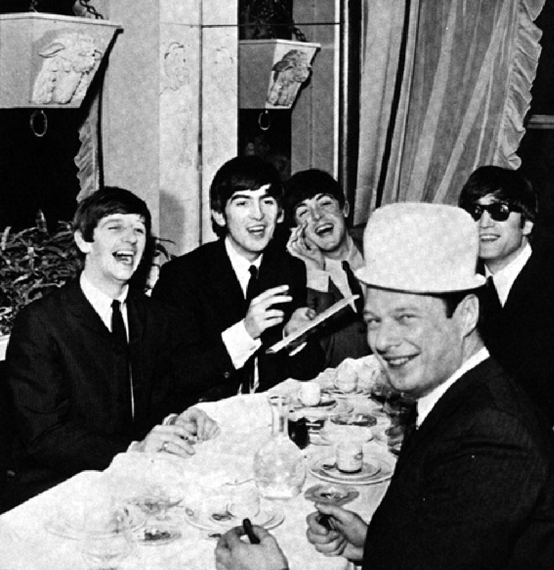 Brian and the Beatles in Paris -- January 1964 -- celebrating the news that "I Want To Hold Your Hand" had reached Number One in the U.S. charts
Brian and the Beatles in Paris -- January 1964 -- celebrating the news that "I Want To Hold Your Hand" had reached Number One in the U.S. charts
I know that the eventual decision to induct Brian owes a lot to my good friend Steven Van Zandt who understands rock history better than most. He became determined that Brian -- and also the great Rolling Stones manager/producer Andrew Loog Oldham -- should be honored. However, being friends with Steven, and working for him as a radio host on his Underground Garage SiriusXM satellite radio channel made it hard for me to directly lobby him about Brian.
But Steven is very smart. He knows about all my work in the Beatles world and he's attended many of my Beatles events. Indeed, he and I even co-hosted a big party at the Hard Rock Cafe in New York on the exact 40th anniversary of the Beatles' first appearance on the Ed Sullivan Show in 2004.
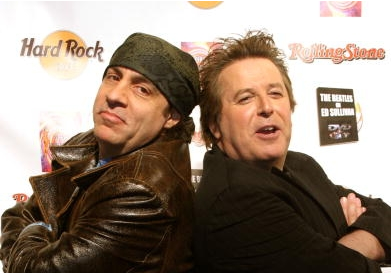 Steven Van Zandt and Martin Lewis on February 9th 2004 at the party they co-hosted in New York celebrating the 40th anniversary of the Beatles "Ed Sullivan Show" debut
Steven Van Zandt and Martin Lewis on February 9th 2004 at the party they co-hosted in New York celebrating the 40th anniversary of the Beatles "Ed Sullivan Show" debut
But, mindful of his official role on the nominating committee of the Rock and Roll Hall of Fame, I tried to never directly hustle him about Brian. Even when we met up last May in Frankfurt when I went to interview Bruce Springsteen for the Amnesty International DVD box-set I was producing -- I held off pitching Steven about Brian. I had to respect his boundaries. But as Steven is very sharp maybe he caught my "it's about bloody time to induct Brian!" thought waves that I was beaming at him silently! Anyway -- I think he's definitely one of the heroes of this belated recognition of Brian.
Ultimately it doesn't matter who did it. All that matters is that Brian has at long last been honored.
"Brian was much more fun than is known. Much more light-hearted and witty and cheeky!" - Derek Taylor
Brian was one of nine inductees in the 2014 Hall Of Fame ceremony. What do I feel about the fact that in proceedings that ran a full five and half hours (330 minutes) the amount of time Peter Asher was permitted to speak about Brian when inducting him into the Hall of Fame was a grand total of two and a half minutes?! An entire three-quarters of one percent of the show's running time allocated to the man who gave the world the Beatles -- and helped create the present-day music industry that has provided such a lucrative living for all the directors of the Hall of Fame?! Given the 29 years that it took them to induct Brian -- I was not surprised. After all, the people who run the Hall of Fame know what they are doing. They are all honorable men...
Please click here to read brand-new tributes to Brian Epstein that I've just received from people who really respect him. Including from GEORGE MARTIN, PATTIE BOYD, YOKO ONO, ANDREW LOOG OLDHAM, PETER BROWN, PETER ASHER and others in the Beatles' inner circle.
More Information about Brian Epstein

